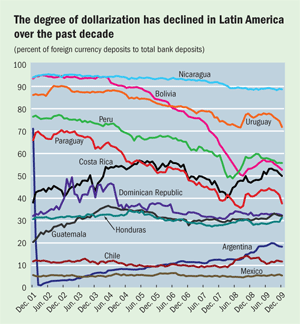Dollarization Declines in Latin America
Finance & Development, March 2010, Volume 47, Number 1
Latin Americans are placing more value in their own currencies
LATIN AMERICAN countries are among the most dollarized in the world. While the extent of dollarization—when foreign currency is used in place of the local currency—varies widely among countries in the region, in most cases the ratio of foreign currency deposits to total bank deposits (one very common measure of dollarization) exceeded 30 percent at the end of 2009, and was sometimes much higher. Latin America is not alone in this respect: other emerging economies, such as the former Soviet Union countries and southeastern European countries also show a high degree of dollarization, ranging from 30 percent to 70 percent.

But some Latin American countries have managed to achieve a significant reduction in dollarization over the past 10 years, particularly countries with very high dollarization in 2001. The most prominent examples are Bolivia, Paraguay, and Peru, where the share of foreign currency deposits fell from 93 to 53 percent, 66 to 38 percent, and 76 to 56 percent, respectively. While this downward trend has slowed recently, with the interruption associated with the global financial crisis, dollarization levels in these countries remain well below those prevailing as of 2001. This tendency to dedollarize represents an increasing preference for holding the national currency, which may be linked to the improved confidence that comes with the elimination of high inflation and the implementation of sounder economic and financial policies.
Dollarization has not been declining steadily in all Latin American countries. In Chile and Mexico, dollarization was already relatively low at the beginning of the decade and has remained fairly stable. In Argentina, dollarization fell to near zero with the policy of deposit “pesification” at the beginning of the decade, but subsequently has increased. In some countries of Central America, dollarization showed more fluctuation over the decade, without a clear trend.
What is dollarization?
Cocirculation—also commonly known as dollarization— results when a foreign currency, often the U.S. dollar, is used as a means of payment and store of value in parallel with the national currency. Several factors may affect the degree of dollarization of an economy. One factor is a country’s legal framework. Some countries, for example, do not allow banks to take deposits in foreign currency. Conversely, others have adopted, de jure or de facto, a foreign currency as legal tender. Another factor is inflation. Residents of countries with high and variable inflation may prefer doing business in a foreign currency whose value is more stable. The interest rate differential between instruments denominated in national and foreign currency also influences the preferences of the public, together with expectation of future exchange rate movements.
About the database
The data are derived from the standardized report forms (SRFs) currently used by 114 countries to report monetary data to the IMF’s Statistics Department. The SRF’s uniform presentation across countries according to instrument, currency, and sector, allows for high-quality cross-country analysis. They can be accessed via International Financial Statistics Online at http://elibrary-data.imf.org/DataExplorer.aspx. Excluded from this analysis are Brazil, Colombia, and Venezuela, which do not allow accounts in foreign currency, and Ecuador, El Salvador, and Panama, which are fully dollarized economies. Foreign currency deposits refer to deposits in the domestic banking system and include deposits indexed to a foreign currency.


